Department News & Media Coverage
Lisa Diamond interviewed by KUER to discuss research
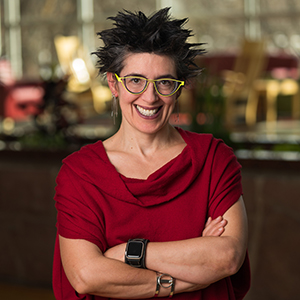 New research led by distinguished professor of Psychology and Gender Studies, Dr.
Lisa Diamond, found that nearly half of Utah women have experienced chronic unsafety
at some point in their lives. Nearly 15% currently feel chronically unsafe. Her report
was recently released by the Utah Women in Leadership Project.
New research led by distinguished professor of Psychology and Gender Studies, Dr.
Lisa Diamond, found that nearly half of Utah women have experienced chronic unsafety
at some point in their lives. Nearly 15% currently feel chronically unsafe. Her report
was recently released by the Utah Women in Leadership Project.
Dr. Diamond recently sat down with KUER to discuss her work.
As Dr. Diamond notes, “One of the things that does make Utah distinct are its demographics in terms of race and ethnicity. Individuals that have very clear distinctions between minority and major majority groups make it more clear to marginalized folks that they aren't the majority, that they are on the outside, that they are different. I also think that religious cultures in general can offer both tremendous safety for those who are within that tradition and unsafety for those who are questioning the tradition or feel themselves on the outside of that tradition.”
BHIDC aims to expand mental health services in SLC Valley
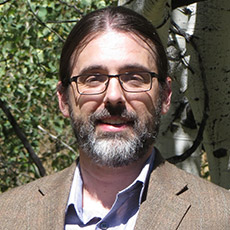 Behavioral Health Innovation and Dissemination Center (BHIDC) Co-Director Dr. Brian
Baucom sat down to discuss the challenges faced by people seeking mental health care,
and what their group is doing to bridge the gap in services within our community.
Behavioral Health Innovation and Dissemination Center (BHIDC) Co-Director Dr. Brian
Baucom sat down to discuss the challenges faced by people seeking mental health care,
and what their group is doing to bridge the gap in services within our community.
The BHIDC provides high-quality, evidenced-based treatment to individuals and families of all ages. BHIDC is staffed by University of Utah faculty who are licensed psychologists and social workers as well as University of Utah graduate level trainees in social work, psychology, psychiatry, and nursing.
In addition to their clinical offerings, the BHIDC is also provides training experience for undergraduate, graduate, doctoral, and post-doc trainees in the fields of psychology, social work, nursing, and psychiatry. All trainees are supervised by licensed clinicians who are established in their clinical specialty.
A Social Scientist Explains What It Means To Be A True LGBT Ally
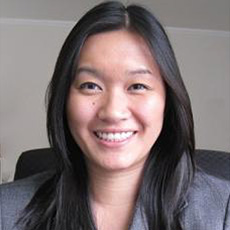 LGBT people are at higher risk for serious mental health issues and Jackie Chen’s
study showed that sincere and resourceful allies can help mitigate the negative effects
of discrimination, humiliation and bullying experienced by LGBT people.
LGBT people are at higher risk for serious mental health issues and Jackie Chen’s
study showed that sincere and resourceful allies can help mitigate the negative effects
of discrimination, humiliation and bullying experienced by LGBT people.
Read Jackie's Feature in Forbes
Chen, J. M., Joel, S., & Castro Lingl, D. (2023, March 30). Antecedents and Consequences of LGBT Individuals’ Perceptions of Straight Allyship. Journal of Personality and Social Psychology. Advanced online publication. https://dx.doi.org/10.1037/pspi0000422.
Why Frenemies May Be Hazardous to Your Health
 This article mentions research by Bert Uchino and Julianne Holt-Lunstad showing how
ambivalent relationships can damage your health.
This article mentions research by Bert Uchino and Julianne Holt-Lunstad showing how
ambivalent relationships can damage your health.
How faculty behavior impacts student participation in STEM

Faculty who behave “communally” will have better success directing students into their fields associated with science, technology, engineering and math (STEM). A study carried out by Jackie Chen, Jasmine Norman and Danielle Geerling shows that faculty are important figures who can confer a myriad of benefits for students’ educational paths.
Why Is the U.S. So Good at Killing Pedestrians?
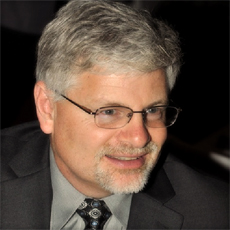 David Strayer was featured on the episode “Why Is the U.S. So Good at Killing Pedestrians?”
on Freakonomics Radio. In Utah, the show airs on KUER on Saturday at 3 p.m. on 90.1
FM. You can also find the episode featuring David on their site.
David Strayer was featured on the episode “Why Is the U.S. So Good at Killing Pedestrians?”
on Freakonomics Radio. In Utah, the show airs on KUER on Saturday at 3 p.m. on 90.1
FM. You can also find the episode featuring David on their site.
Congratulations to our 2023 Graduates!
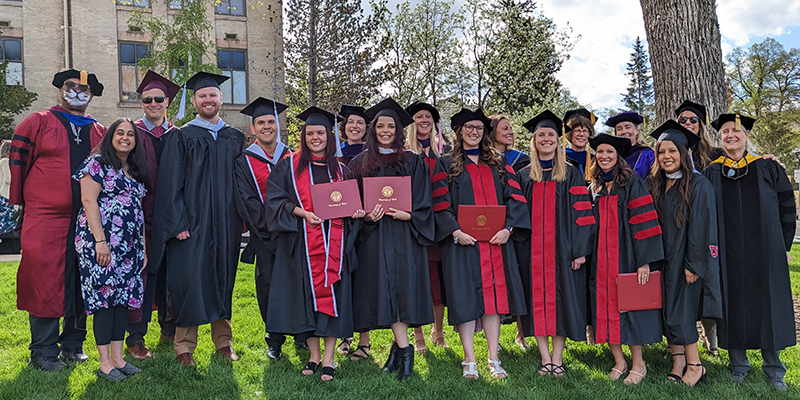
Pictured above - starting from the Left: Paul White (behind), Anu Asnaani (front), Jonathan Butner (behind, Logan Call (front), Manuel Gutierrez Chavez (behind), Katie Wyant-Stein (front), Sarah Creem-Regehr (behind), Nicolette Molina (front), Amy McDonnell (behind), Morgan Saxon (front), Kristina Rand (behind), Holly Gagnon (front), Cindy Berg (behind), Mary Jane Campbell (front), Sheila Crowell (behind), Lilian Bautista (front), Jeanine Stefanucci (behind), and Lisa Aspinwall (front).
2023 Graduates
PhDs
August 2022
- Mallory Kidwell
- Kimberly Parkhurst
- Brianna Wellen
- Mindy Brown
- Kent Hinkson
- Kelsi Rugo Cook
December 2022
- Colin Adamo
May 2023
- Robert Vlisides-Henry
August 2023
- MaryJane Campbell
- Amy McDonnell
- Lucybel Mendez
Anticipated in August 2023
- Holly Gagnon
- Morgan Saxon
- Jack Silcox
Master's of Science - MS
August 2022
- Michelle Gereau
- Julia Vehar
December 2022
- Logan Call
- Clara Lopes
- Morgan Saxon
- Tracey Tacana
May 2023
- Lilly Bautista
- Manuel Gutierrez Chavez
- Nicolette Molina
- Katie Wyant-Stein
Welcoming New Faculty
Starting in the fall we have six new faculty joining our ranks in Utah (three tenure-track and three career line) and two more at our Asian Campus.
- Monika Lohani, Kara Moore, and Jared Branch all add to our cognitive neuroscience program.
- Samantha Moore-Berg and Katherine Pagano add to our social program.
- Mona Yaptangco joins the ranks of our clinical faculty serving at BHIDC.
- Di Zhang joins us as a visiting professor in our developmental program.
- Finally, Hannah Myung and Jaewon Oh will be joining in Songdo.
Welcoming New Graduate Students
Starting in the fall we have eight new graduate students joining us:
- Giovanni Marquez
- Dakota Dolister
- Emily Spargo
- Aydin Tasevac
- Alex Detrich
- Rosemary Rojas
- Haley Bock
- Inakhshmi (Inaki) Rashid
- Dara Zwemer
- Yu Chenxin
NOTEABLE ACHIEVEMENT! - Psychology Department
According to University HQ, a leading independent education organization, the University of Utah is ranked #9 for the Best Online Bachelor’s Degree in Psychology for 2023.
The Psychology department offers both a major and minor as well as certificate in Human Factors and one in Infant Mental Health. View undergraduate degree and certificates for more information
Treatment Mechanisms, Community Empowerment,Technology Innovations (TCT)Lab Highlight
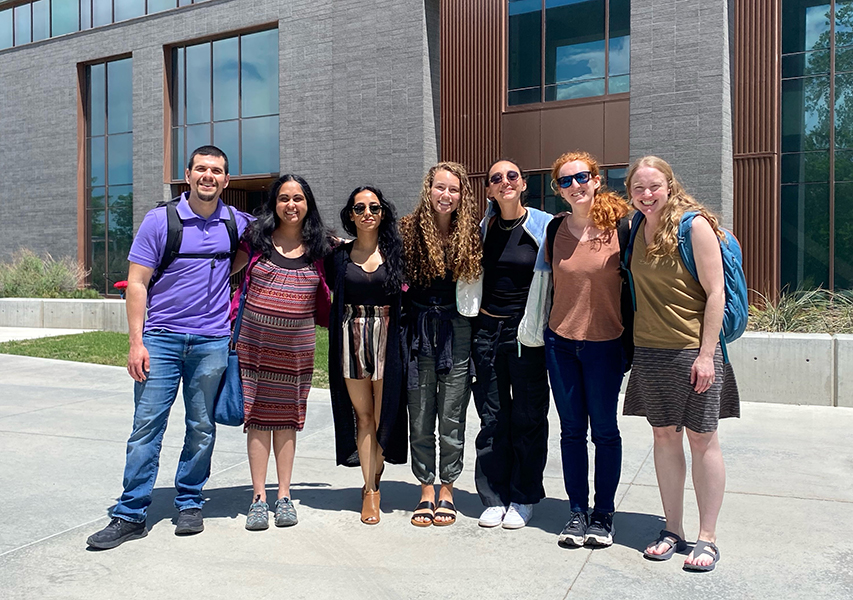
We are the Treatment Mechanisms, Community Empowerment, Technology Innovations Lab, or the TCT Lab. Dr. Anu Asnaani started this lab in 2019 with a handful of undergraduate students and a lab manager. We now include three current graduate students, Brooke Franklin, Kiran Kaur, and Manuel (Manny) Gutierrez Chavez, and one alumnus, Dr. Kent Hinkson.
Psychological research is beautifully complex due to the varying interactions we must have with other people (i.e., participants, researchers) and their personal histories, not in the same way a sedimentologist studies rocks to determine Earth’s history. We may know a person’s exact age and a rock’s exact age, but would we ask the rock if it feels its age (maybe the rock is in its villain era)? We study what can be observed and the meaning people make in their own contexts. Our Major objectives include to better understand the mechanisms that underlie change in fear-based symptoms, improving outcomes that matter to a diversity of individuals through community empowerment, and leveraging the latest technological innovations to expand access to evidence-based interventions on a local and global scale.
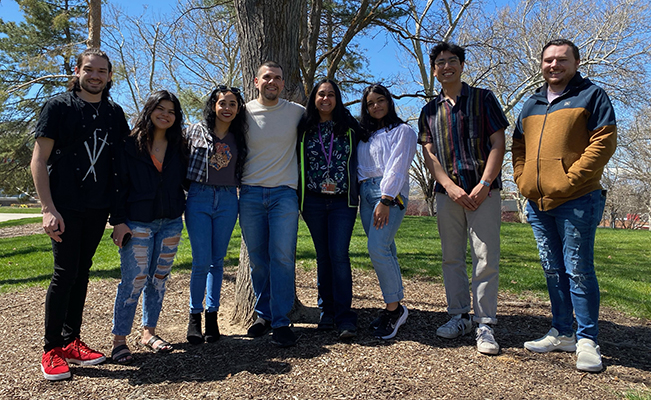 One of our studies, funded by the National Institute of Health (NIH), is focused on
developing innovative technology to objectively monitor handwashing compulsions in
individuals with obsessive-compulsive disorder (OCD) by tracking frequency and time
spent handwashing. This innovation will facilitate better treatment by reducing patients’
tracking burden. Kiran’s study on emotion regulation flexibility with ethnic minority
college students (which she received an NIH fellowship for) focuses on facilitating
better mental health, addressing ongoing health disparities disproportionately impacting
ethnic minority college students (CS), and increasing their retention in academia
and subsequent pathways out of poverty. This project hopes to contribute substantially
to understanding the mental health needs of ethnically diverse students by studying
their ability to regulate emotions during stressful situations and will create a foundation
for future research to develop and test culturally-tailored interventions. Manny’s
Atención Plena (Mindfulness) study, funded by the Association for Contextual Behavioral
Science (ACBS), is built off of Dr. Asnaani’s community-engaged mental health study
where the TCT lab worked with five diverse communities in the Salt Lake Valley. Specifically,
Manny is working with the Hispanic Health Care Task Force (HHCTF) to explore the local
Latine community’s strengths related to their family culture around meals, coping
with emotions, and use of mindfulness techniques. Ultimately, the program will attempt
to enhance family meals and emotional coping skills with high ecological validity.
As our projects have unfolded and funding has ended, we’ve remained connected to the
communities we’ve interacted with. For example, we have tabled at local community
events at their request, and we’ve continued providing psychosocial skills trainings
to local community health worker task forces and to trauma care providers in the Caribbean
region.
One of our studies, funded by the National Institute of Health (NIH), is focused on
developing innovative technology to objectively monitor handwashing compulsions in
individuals with obsessive-compulsive disorder (OCD) by tracking frequency and time
spent handwashing. This innovation will facilitate better treatment by reducing patients’
tracking burden. Kiran’s study on emotion regulation flexibility with ethnic minority
college students (which she received an NIH fellowship for) focuses on facilitating
better mental health, addressing ongoing health disparities disproportionately impacting
ethnic minority college students (CS), and increasing their retention in academia
and subsequent pathways out of poverty. This project hopes to contribute substantially
to understanding the mental health needs of ethnically diverse students by studying
their ability to regulate emotions during stressful situations and will create a foundation
for future research to develop and test culturally-tailored interventions. Manny’s
Atención Plena (Mindfulness) study, funded by the Association for Contextual Behavioral
Science (ACBS), is built off of Dr. Asnaani’s community-engaged mental health study
where the TCT lab worked with five diverse communities in the Salt Lake Valley. Specifically,
Manny is working with the Hispanic Health Care Task Force (HHCTF) to explore the local
Latine community’s strengths related to their family culture around meals, coping
with emotions, and use of mindfulness techniques. Ultimately, the program will attempt
to enhance family meals and emotional coping skills with high ecological validity.
As our projects have unfolded and funding has ended, we’ve remained connected to the
communities we’ve interacted with. For example, we have tabled at local community
events at their request, and we’ve continued providing psychosocial skills trainings
to local community health worker task forces and to trauma care providers in the Caribbean
region.
